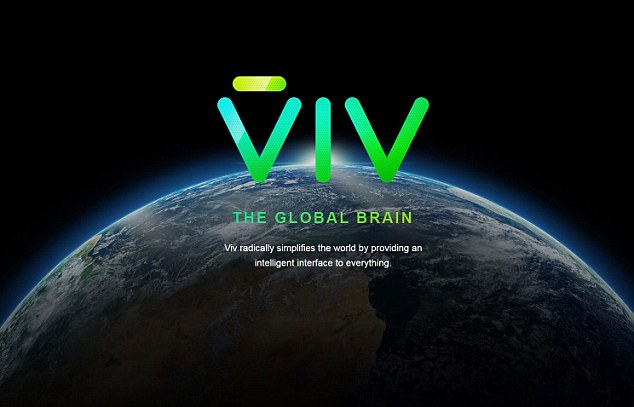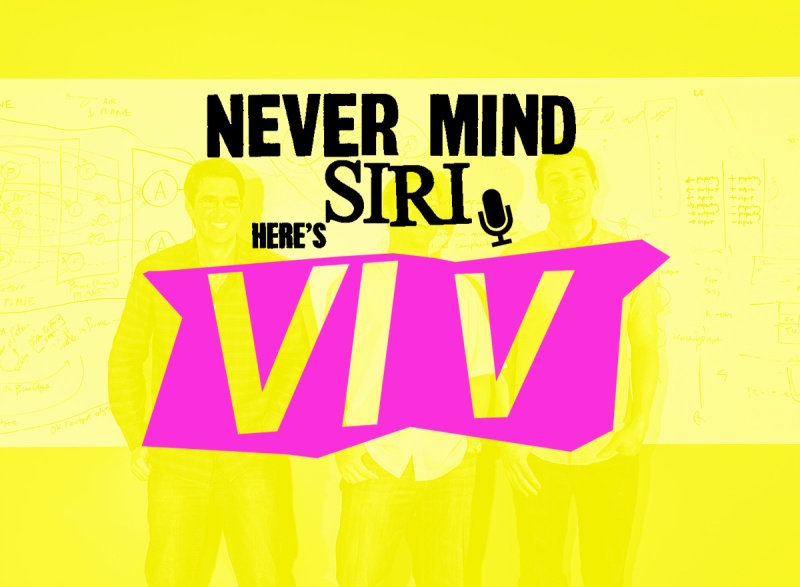
Giant brain in the sky' called Viv will make 'mental leaps' to solve problems - and it could one day outsmart us
- Siri creator Dag Kittlaus made the claims at SXSW Interactive in Texas
- Working on Viv - a cloud-based brain - capable of making 'mental leaps'
- He believes supercomputers will one day replace entrepreneurs
From Stanley Kubrick’s HAL 9000 in his 1968 sci-fi classic 2001: A Space Odyssey, to Samantha, the AI assistant that Joaquin Phoenix fell in love with in Spike Jonze’s film Her, humanity has long dreamt of the day it can just talk to its computers.
And some very bright people indeed are betting this will be the way we’ll all interact with our computers very soon.
We’ve all heard of Siri, of course – Apple’s AI assistant, built right into the iPhone and iPad. And there’s Google Now helping people find their way home after work on their Android devices. Even Windows has its own personal assistant – Cortana. And then there’s Amazon’s Alexa, and those Facebook bots that nobody seems to be able to get to work properly.
What we talk about when we talk about artificial intelligence is really just a conversational interface with a computer – in other words, you talk to it, it can understand, talk back, and do things for you.
One of the men behind Siri has other ideas, though. Dag Kittlaus is one of Siri’s co-founders. He went to work for Apple after it bought Siri, but left a couple of years later.
Well, he’s back with a new company which is building an intelligent assistant called Viv.
He showed off its capabilities this week. It worked flawlessly, using speech-recognition technology from a company called Nuance (which provides Siri’s).
But it was Viv’s potential which got the tech world excited.

Viv will work across any device – and that means you should be able to use it on your iPhone or you Android phone, as well as many other devices.
It will also be personalised – it will get to know you and tailor its actions to your likes and dislikes (booking plane tickets in your preferred seat, for example). It will live in the Cloud and remember you, too, so you don’t have to start again every time you get a new device.
The biggest news, though, was that Viv will be open to third-party developers, allowing anyone to plug into it, and brings new capabilities and services into the system. Dag likened it to the explosion in creativity that followed Apple opening up the iPhone to outside developers.
These features are what gives Viv the edge over Siri, Google Now, Alexa, and Cortana which are all closed systems, tied to a certain device or company, and offer a limited number of actions.
Viv will hopefully come to lots of devices and be quicker to evolve and learn how to do new and ever-more more sophisticated things – and not just on phones. In the future we’ll be talking to lots of devices – fridges, cars, TVs, or heating systems.
It sounds like the distant future, but Viv will launch before the end of the year and bring us closer to a world so many have only dreamt of.

Viv is not the only company competing for a share of those billions. The field of artificial intelligence has become the scene of a frantic corporate arms race, with internet giants snapping up AI startups and talent. Google recently paid a reported £400 million for the UK deep-learning company DeepMind and has lured AI legends Geoffrey Hinton and Ray Kurzweil to its headquarters in Mountain View, California. Facebook has its own deep-learning group, led by prize hire Yann LeCun from New York University. Their goal is to build a new generation of AI that can process massive troves of data to predict and fulfil our desires.
Viv strives to be the first consumer-friendly assistant that truly achieves that promise. It wants to be not only blindingly smart and infinitely flexible but omnipresent. Viv's creators hope that some day soon it will be embedded in a plethora of internet-connected everyday objects. Viv founders say you'll access its artificial intelligence as a utility, the way you draw on electricity. Simply by speaking, you will connect to what they are calling "a global brain". And that brain can help power a million different apps and devices.
"I'm extremely proud of Siri and the impact it's had on the world, but in many ways it could have been more," Cheyer says. "Now I want to do something bigger than mobile, bigger than consumer, bigger than desktop or enterprise. I want to do something that could fundamentally change the way software is built."

Viv Labs is tucked behind an unmarked door on a middle floor of a generic glass office building in downtown San Jose. Visitors enter into a small suite and walk past a pool table to get to the single conference room, glimpsing on the way a handful of engineers staring into monitors on trestle tables. Once in the meeting room, Kittlaus -- a product-whisperer whose career includes stints at Motorola and Apple -- is usually the one to start things off.
He acknowledges that an abundance of voice-navigated systems already exists. In addition to Siri, there is Google now, which can anticipate some of your needs, alerting you, for example, that you should leave 15 minutes sooner for the airport because of traffic delays. Microsoft, which has been pursuing machine-learning techniques for decades, recently came out with a Siri-like system called Cortana. Amazon uses voice technology in its Fire TV product.
But Kittlaus points out that all of these services are strictly limited. Cheyer elaborates: "Google Now has a huge knowledge graph -- you can ask questions like 'Where was Abraham Lincoln born?' And it can name the city. You can also say, 'What is the population?' of a city and it'll bring up a chart and answer. But you cannot say, 'What is the population of the city where Abraham Lincoln was born?'"

The system may have the data for both these components, but it has no ability to put them together, either to answer a query or to make a smart suggestion.
Like Siri, it can't do anything that coders haven't explicitly programmed it to do.
Viv breaks through those constraints by generating its own code on the fly, no programmers required. Take a complicated command such as "Give me a flight to Dallas with a seat that Shaquille O'Neal could fit in." Viv will parse the sentence and then it will perform its best trick: automatically generating a quick, efficient program to link third-party sources of information together -- say, Kayak, SeatGuru, and the NBA media guide -- so it can identify available flights with lots of legroom. And it can do all of this in a fraction of a second.
Viv is an open system that will let innumerable businesses and applications become part of its boundless brain. The technical barriers are minimal, requiring brief "training" (in some cases, minutes) for Viv to understand the jargon of the specific topic. As Viv's knowledge grows, so will its understanding; its creators have designed it based on three principles they call its "pillars": it will be taught by the world, it will know more than it is taught, and it will learn something every day.

As with other AI products, that teaching involves using sophisticated algorithms to interpret the language and behaviour of people using the system -- the more people use it, the smarter it gets. By knowing who its users are and which services they interact with, Viv can sift through that vast trove of data and find new ways to connect and manipulate the information.

Viv's logo
Kittlaus says the end result will be a digital assistant who knows what you want before you ask for it. He envisions someone unsteadily holding a phone to his mouth outside a club at 2am and saying, "I'm drunk." Without any elaboration, Viv would contact the user's preferred car service, dispatch it to the address where he's half passed out, and direct the driver to take him home. No further consciousness required.
If Kittlaus is in some ways the Steve Jobs of Viv -- he is the only non-engineer on the ten-person team and its main voice on strategy and marketing -- Cheyer is the company's Steve Wozniak, the project's key scientific mind. Unlike the whimsical creator of the Apple II, though, Cheyer is aggressively analytical in every facet of his life, even beyond the workbench. As a child, he was a Rubik's Cube champion, averaging 26 seconds a solution. When he encountered programming, he went in head-first.
"I felt that computers were invented for me," he says. And while in high school he discovered a regimen to force the world to bend to his will. "I live my life by what I call verbally stated goals," he says. "I crystallise a feeling, a need, into words. I think about the words, and I tell everyone I meet, 'This is what I'm doing.' I say it, and then I believe it. By telling people, you're committed to it, and they help you. And it works. "


